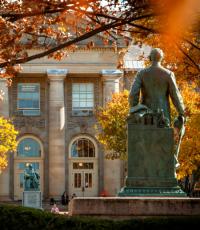
 Department Homepage
The College of Arts & Sciences
Department Homepage
The College of Arts & Sciences
U.S. must get its house in order, Hadley says in Olin Lecture
Former national security adviser Stephen J. Hadley ’69, right, in conversation with former Rep. Steve Israel, left, director of Cornell’s Institute of Politics and Global Affairs, at the Olin Lecture June 7 in Bailey Hall.


